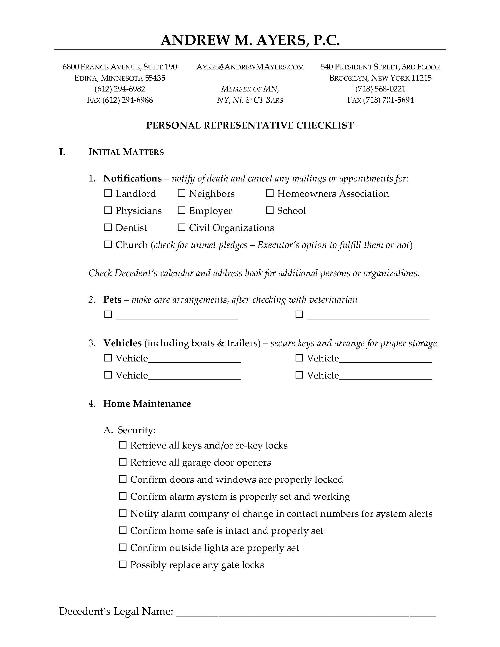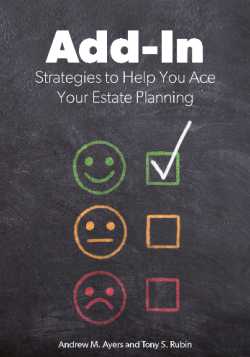 When you start working on an estate plan, you may have questions about the roles that some people will play and what they are called. Depending upon what documents are in your estate plan, you'll have different roles for people to play. Some common roles you'll run into include:
When you start working on an estate plan, you may have questions about the roles that some people will play and what they are called. Depending upon what documents are in your estate plan, you'll have different roles for people to play. Some common roles you'll run into include:
- Executor/Personal Representative - the person designated to distribute your estate after you're gone
- Agent In Fact - the person who you choose to manage your finances under a power of attorney
- Guardian - the person who will take care of your children if you die before they reach the age of 18
If you are creating a trust as part of your estate plan, you'll also encounter the term "Trustee" in your documents. Sometimes, you'll be creating a standalone trust, a document that is separate from your will. Others may create a testamentary trust, a trust that is created by your will only after you die. No matter which type of trust you create, you'll likely have questions about trustees and how they are different than a personal representative.
A trustee is a person or organization that is responsible for managing assets on behalf of another person or group. The role of a trustee can vary depending on the type of trust, but generally, a trustee is responsible for safeguarding the assets in the trust, investing them wisely, and distributing them according to the terms of the trust.
What is a Trust?
Before we dive into the role of a trustee, it's important to understand what a trust is. A trust is a legal arrangement that allows a third party, the trustee, to hold and manage assets on behalf of a beneficiary. A trust can be created for many reasons, such as to provide for a child's education, to protect assets from creditors, or to support a charitable organization.
A trust typically has three parties:
- The settlor: The person who creates the trust and transfers assets into it.
- The trustee: The person or organization responsible for managing the assets in the trust.
- The beneficiary: The person or group that benefits from the assets in the trust.
One common question that arises with clients is "Do I have to have 3 different people under my trust?" Depending on the type of trust you are creating, you can actually have the same person be the settlor, trustee, and beneficiary. However, you want to make sure you are getting professional advice and setting up the correct type of trust - for example, this arrangement would not work for a special needs trust.
The Role of a Trustee
The role of a trustee is to manage the assets in the trust for the benefit of the beneficiaries, whether they are the beneficiary or the beneficiary is someone else. Some of the responsibilities of the trustee include:
-
Safeguarding the assets: The trustee must take reasonable steps to protect the assets in the trust from loss or damage. This may involve purchasing insurance, storing assets in a secure location, or diversifying investments to reduce risk.
-
Investing the assets: The trustee is responsible for investing the assets in the trust in a prudent and appropriate manner. This may involve working with financial advisors or investment managers to create a diversified investment portfolio that balances risk and return.
-
Distributing the assets: The trustee must distribute the assets in the trust according to the terms of the trust. This may involve making regular payments to the beneficiaries, or distributing assets in a lump sum at a specific time or event.
-
Administering the trust: The trustee is responsible for keeping accurate records of all transactions related to the trust, including investments, distributions, and expenses. The trustee must also file any required tax returns and comply with all legal and regulatory requirements.
The trustee's obligations to the beneficiaries are fiduciary in nature, meaning that they have a legal obligation to act in the best interests of the beneficiaries at all times. This means that the trustee must act with honesty, integrity, and loyalty, and must avoid any conflicts of interest that could compromise their duty to the beneficiaries.
Drawbacks to Being a Trustee
While being a trustee can be a rewarding experience, it can also be a complex and potentially risky one. Some possible challenges they may encounter:
-
Breach of trust: Trustees who fail to fulfill their duties or act in the best interests of the beneficiaries can be held liable for breach of trust. This can result in legal action, fines, or even criminal charges.
-
Investment losses: Trustees who make poor investment decisions or fail to diversify the trust's assets can be held liable for investment losses. This can be especially damaging if the losses are significant or could have been avoided with better management.
-
Conflicts of interest: Trustees who have personal or financial relationships with the beneficiaries or other parties involved in the trust can be seen as having a conflict of interest. This can create an ethical dilemma for the trustee and may compromise their ability to act in the best interests of the beneficiaries.
-
Tax implications: Trustees must ensure that the trust complies with all tax laws and regulations. Failure to do so can result in penalties, fines, or even legal action.
There is a bit of complexity that goes into creating trusts and ensuring that you've chosen the right person to act as the trustee for your trust. This is an area of estate planning where it is especially important to work with a professional and not a form-filling website.
Do You Need an Estate Plan?
If you don't already have an estate plan, or if you have one that needs to be updated, let's schedule a Legal Strategy Session online or by calling my Edina, Minnesota office at (612) 294-6982 or my New York City office at (646) 847-3560. My office will be happy to find a convenient time for us to have a phone call to review the best options and next steps for you to work with an estate planning attorney to get your estate plan prepared.





